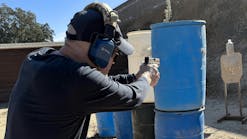Since the reclassification fight began and APCO put out the call to action, I’ve seen some interesting developments within the public safety telecommunications world. First, it seems we’re finally waking up and fighting for what we know is right-being classified as protective services and not clerical. We’ve always know the work we do is nothing like a secretary or a taxi dispatcher. It just seems we had either no idea we were not classified as such or we didn’t think there was anything we could do about it. So this opportunity to make a change, which only comes every 10 years, has made many of us start thinking about how we are viewed occupationally and, even more exciting standing up for what is true and right about us.
Out of this discussion came a movement #IAM911. 911 Dispatchers from around the country have been telling snippets of their story and these have become Facebook memes and “From the Inbox” statuses from a site called Within the Trenches Podcast. The snippets are gritty, heartbreaking and real. I can’t read them without crying. I cry for all the people involved in the call including the 911 operator. I nod my head in understanding for the calls I relate to, the ones that are similar to ones I’ve taken. And, I empathize with the calls I’ve never experienced because the feeling of helplessness, anger and grief that comes with doing this work is universal. Nobody no matter how hardened, jaded and compartmentalized can wear the headset for any length of time without being affected by what they hear. To me, this is a no brainer although it seems like so many people still want to view us as just telephone operators or radio dispatchers. As if we are just a switchboard or a service dispatcher. In fact, the reclassification committee, even after hearing testimony from the people who know what we do and go through, made the recommendation not to change the classification. How is that even possible? Obviously the idea that we are not first responders because we are not physically on-scene is so ingrained in people that it’s surprisingly hard to crack. But we won’t stop trying.
All of this aside, what has been most interesting to me about the #IAM911 movement is there has been some major pushback within our ranks. People who believe that the stories are too graphic and unnecessary. Many who seem to think that we shouldn’t be sharing these stories and more specifically we shouldn't be sharing our underlying feelings about these stories publicly. This brings me to an interesting conclusion-although we want to be viewed as caring humans doing our best to help people in their worst moments, we don’t want to admit that we are human, that we do get affected by the work that we do, that we are not machines. I had to stop and ask myself why we have this dichotomous attitude. Then I remembered what Jim Marshall calls our emotional code. We are trained and work in a world where being stoic means you are a good 911 dispatcher. Showing emotion means you are weak, cannot be relied on and could quite possibly get someone killed. Of course this is not reality at all. We don’t seem to have a middle ground. You can either be hard as a rock or a sobbing, ridiculous mess. What #IAM911 proposes is that we can do our jobs well and still have healthy human emotions that need to be vented and validated. When we don’t acknowledge the need to de-stress and work through the grief of the tragedies we handle, we hurt ourselves, physically, emotionally and mentally. But, that seems to be an acceptable price to pay and this is what has to change.
So this movement is not only about asking for our due recognition of being first responders that handle emergencies from the first beep to the final click when field responders arrive, but also about allowing ourselves to be open to being human. So many 911 Dispatchers that I’ve interviewed have said that the one thing they wish the public would understand is that they are human. We need to start allowing ourselves and each other to be human too. So many of the veteran dispatchers I’ve spoken with have said that they wish they had given themselves the space to process the calls and their natural responses to them instead of just stuffing them away year after year after year. They want the next generation of operators to know that this isn’t healthy and that they want something better for them. It’s not going to be easy to move away from our emotional code. There will still be people who look down on those who recognize, normalize and mitigate the stress responses that come naturally with this type of emergency work. Honestly, we need to look beyond them and start taking care of ourselves like the humans we are. Unfortunately, we cannot just get some lube and be rebooted each shift. We need to exercise, eat well, do stress reduction activities like meditate, journal or color. Play with pets. Share your true feelings with co-workers. Grieve. Be angry. Experience your natural reactions to these unusual events. Feel things and let them go. Seek help when you need it. We can all grow healthier if we are all willing to admit to ourselves and to others-Yes I am a 911 Dispatcher. Yes I can handle your emergency with professionalism and poise. Yes I am human.

Michelle Perin
Michelle Perin has been a freelance writer since 2000. In December 2010, she earned her Master’s degree in Criminology and Criminal Justice from Indiana State University.


